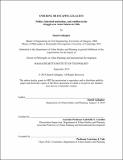Enduring or escaping legacies? : Politics, inherited institutions, and rebellion in the struggle over water futures in Chile
Author(s)
Gallagher, Daniel,Ph. D.Massachusetts Institute of Technology.
Download1139710481-MIT.pdf (17.76Mb)
Alternative title
Politics, inherited institutions, and rebellion in the struggle over water futures in Chile
Other Contributors
Massachusetts Institute of Technology. Department of Urban Studies and Planning.
Advisor
Gabriella Y. Carolini.
Terms of use
Metadata
Show full item recordAbstract
Following a wave of insurgent political action in 2011, the hegemony that governs life in Chile appears to be increasingly threatened. One area of politicized struggle has coalesced around water law. On one side of the struggle, water utilities, agro-export firms and entrenched political actors seek to retain the water laws inherited from the nation's 1973-1990 dictatorship. On the other, socio-political movements and recently elected political actors are challenging what they see as the political content of those laws that prioritize private economic gains. Why does politicization take the form it does in Chile? To what extent, if at all, is politicization of water law reconfiguring the institutions of urban governance? Responding to scholarship in "post-political" urban governance, I draw on ethnographic fieldwork, process tracing, and historical analysis to present a narrative of the multi-scalar struggle over water laws that explains the effects of the new wave of political action. First, I argue that a range of factors combined to enable a politicization of water laws. Those factors include (i) the failure of a private water firm to depoliticize disruptions in water supply to the nation's capital (ii) the hyper-inequality in water access across the national territory produced by legally-sanctioned processes of accumulation by dispossession and (iii) a loss of fear of political disagreement in a new generation of politically-active youth, which translated to the formal political arena. Second, I argue that politicization has widened the parameters of political debate and the collective imagination of different political trajectories. Issues naturalized during past decades are now rendered highly contentious and political action conducted "back stage" is increasingly exposed "front stage" through protest, congressional investigation and an invigorated independent media. Third, I argue that despite leftist politicians' pursuit of ambitious congressional reforms to national water laws, institutional reform is foreclosed due to material and discursive forces acting across geographical scales. I posit that Chile's institutional inertia in water law can be explained by an incomplete generational shift following the fall of dictatorship, wider political instability in the Latin American region, and Chile's deep articulation with global economic forces. Keywords: law; neoliberalism; politicization; post-politics; urban governance; water.
Description
This electronic version was submitted by the student author. The certified thesis is available in the Institute Archives and Special Collections. Thesis: Ph. D., Massachusetts Institute of Technology, Department of Urban Studies and Planning, 2019 Cataloged from student-submitted PDF version of thesis. Includes bibliographical references (pages 228-251).
Date issued
2019Department
Massachusetts Institute of Technology. Department of Urban Studies and PlanningPublisher
Massachusetts Institute of Technology
Keywords
Urban Studies and Planning.